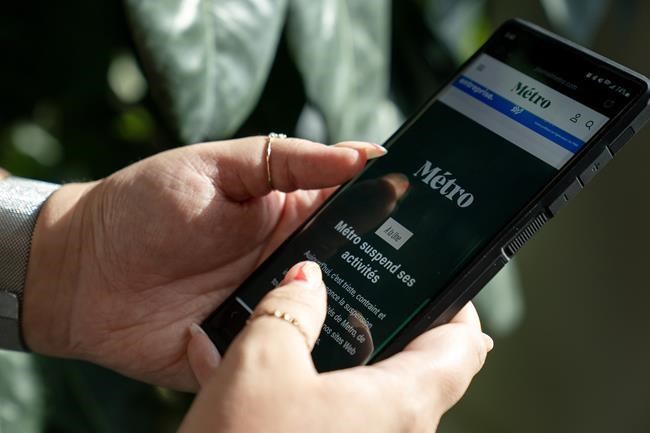MONTREAL — The abrupt closure of Quebec newspaper publisher Métro Média will end news coverage of local government in parts of the province’s two largest cities, media observers say.
Andrew Mulé, Métro Média's president and CEO, announced the immediate suspension of operations at the company's more than 30 hyperlocal publications — including 17 print newspapers — in a statement sent to employees, colleagues and contributors late Friday afternoon.
He said he was informed Wednesday that the company no longer had the liquidity to continue, despite what he described as a "healthy balance sheet."
"Time was my worst enemy and what I feared has unfortunately arrived, in an abrupt and sudden manner," he wrote.
Jean-Hugues Roy, a journalism professor at the Université du Québec à Montréal, said the end of the company's operations was a tragedy, even if it was expected.
"It's an atomic bomb for local news in Montreal and Quebec," he said in an interview. "It's a piece of journalistic history, but also the history of certain neighbourhoods that's disappearing."
One of the company's papers, “Le Messager de Verdun,” which serves an area in southwestern Montreal, celebrated its 110th anniversary this year, he said.
"These are communities that counted on their newspapers as sources of information."
His colleague Patrick White, who also teaches journalism at UQAM, said the closure will create "news deserts" in Quebec's two largest cities.
"It's very, very bad news for local democracy," he said in a phone interview. "It's the end of hyperlocal coverage in Montreal and Quebec City. There's going to be no coverage of borough councils."
Montreal and Quebec City's boroughs are responsible for a wide range of municipal services, including urban planning, waste collection and maintenance of local roads and parks.
A large Quebec media union, the Fédération nationale de la culture et des communications, is calling for government action to preserve local news on Montreal Island.
Union President Annick Charette said the labour organization worked with Métro Média's owners and met with investors and the city of Montreal to try and find solutions.
"I hope that this closure will only be temporary," she said.
Métro Média was created in 2018 when Montreal businessman Michael Raffoul acquired 30 publications, including the daily free newspaper Métro and 29 weekly community papers -- from printer Transcontinental Inc. Several publications have already been shut down.
The company said on its website that Métro had 100,000 readers every week and its website received nearly two million unique visitors a month. It distributed a total of 165,000 copies of its weekly papers each month.
The company had around 100 employees, though it went through layoffs last winter and over the course of the past few weeks.
Mulé declined an interview request from The Canadian Press, saying his statement included everything he wanted to get across.
Despite a major shift online, Mulé said "Métro received a particularly devastating blow when the mayor of Montreal announced the end of our distribution method, Publisac."
Since mid-May the City of Montreal has banned distributing bags of print flyers except to people who opt-in to receive them, replacing the previous opt-out system.
Métro Média's weekly newspapers were distributed through those flyer bags.
Mulé said the company "couldn't suffer a sudden, devastating revenue loss and follow our ambitious and costly digital road map without external financial assistance."
"We are, after all, a small business without financing and the premature end of our print media made it so that we had no means to rapidly finance our future without a major investment."
Montreal Mayor Valérie Plante issued a post on X, the social media platform formerly known as Twitter, saying the closure was a major loss, but didn't respond to Mulé's criticisms that her decision to limit the distribution of flyers led to the closure.
"The radical transformation of the media's business environment requires urgent consideration and collective solutions," she wrote.
Mulé responded to her post saying that "the beauty of communicating on social media is total control of the message when you publish it, without the need for independent fact-checking. Good luck with that Montreal."
This report by The Canadian Press was first published Aug. 13, 2023.
Marie-Ève Martel, The Canadian Press

